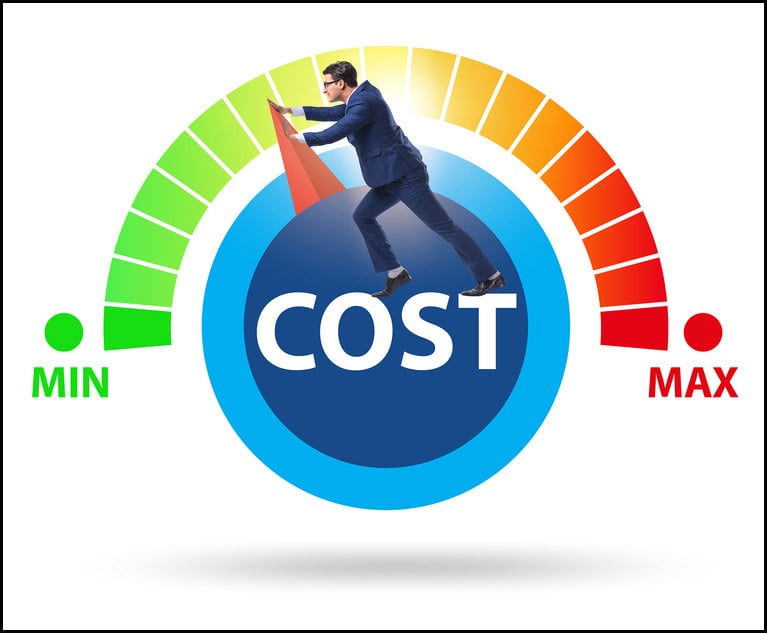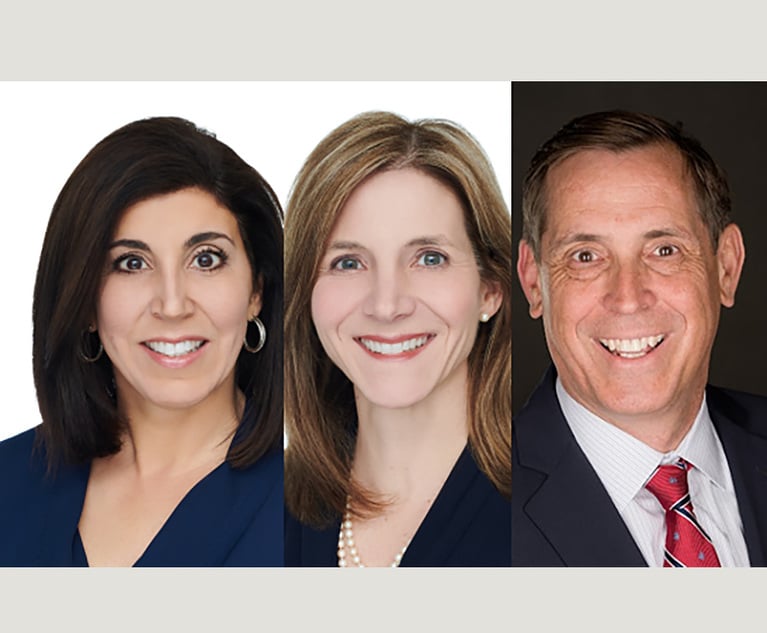How Law Firms Can Move Beyond the Diversity Echo Chamber
Diversity conferences can be transformative for lawyers, argues Hogan Lovells' senior inclusion manager.
March 06, 2020 at 04:58 PM
6 minute read
 Photo: KatyaRusha/Shutterstock.com
Photo: KatyaRusha/Shutterstock.com
Whether conscious or not, many diverse lawyers take risks daily that take a toll on their psyche and their sense of worth in an effort to succeed in an environment not set up for them. Lives like these require psychological fortitude and institutional support to navigate the balance beam of authenticity and success in the law. Suparna Reddy, an associate in Hogan Lovells' antitrust, competition and economic regulation practice in Washington, D.C., said: "The added burden diverse lawyers must carry as they navigate the legal profession can be daunting, but an organization stands out when it makes a sincere effort to understand, alleviate and transform that weight into a strength."
I am a queer woman of color, the daughter of an Angolan immigrant (now American citizen) and a black woman from North Carolina. I went from Harvard Law School to a large law firm. Then I became an in-house lawyer and diversity consultant. I am now a diversity and inclusion professional at Hogan Lovells. Many diverse lawyers, regardless of which large firms they presently work for, have stories that may not be identical to mine, but are equally complex.
To its credit, the legal industry has significantly increased its effort and attention on diversity and inclusion. It has made headway on entry- and junior-level recruiting, but retention remains a critical challenge. There is still a set of unwritten rules that are the key to success that many diverse lawyers haven't been provided due to lack of mentoring and access. This is still true today for many diverse lawyers.
Firms are addressing the challenge of retaining diverse lawyers in different ways, including through programming. Hogan Lovells created Allverse, a conference of U.S. minority and LGBT+ lawyers that has one primary purpose: to demonstrate the institutional support necessary for our diverse lawyers to succeed and to help provide answers to some questions about authenticity and success. While diversity conferences aren't unprecedented at law firms, a focus on minority and LGBT+ lawyers specifically with an integration of clients and senior leadership is something to be proud of.
Our theme this year was "Launching a Legacy," which is apt in a conservative profession that hasn't made nearly as much progress on diversity and inclusion as anyone might have expected during the last 30 years.
There is no blueprint for success for diverse lawyers. With all of our different identities, histories and skill sets, it's unlikely that any pre-set diversity decoder ring would fit our fingers. Each of us is approaching it as if it is the first time it has been done—and sometimes it is. We have to figure out the environment at the same time we are supposed to excel beyond measure in it.
So our aim is to acknowledge the truth that diverse lawyers will need to create a trajectory for themselves in their careers, which may look and be different than anything that has come before. Diversity conferences and other comprehensive programming are an opportunity for the firm to provide inspiration, access and a safe space to explore issues diverse lawyers regularly confront. The well our participants drew from this year included strategies to navigate authenticity, negotiate covering, and manage personal and professional crises, all of which are so much more challenging when there is no off-the-shelf blueprint.
Whether through programming or otherwise, law firms need to cultivate the integration of the ingredients that diverse lawyers need to succeed: a firm infrastructure that understands and works to mitigate bias, opportunities to demonstrate their skills, and investments to ensure that those opportunities manifest as successfully as possible. Articulating the future we work daily to create, the firm's CEO, Steve Immelt, said that, "We need to be prepared to tell each other the truth, even when that may feel uncomfortable and perhaps even challenge assumptions about our firm and its culture. … We need to understand the stakes when opportunities are missed, when people feel misunderstood." Our diversity conference is about "creating a community, but it is also about being tactical, about making things happen," he continued.
Hearing the head of the firm talk candidly about issues that impact diverse lawyers daily is powerful, and can impart confidence about the firm's path forward.
Those who tend to oppose diversity conferences often criticize them for being an echo chamber where people who know the challenges related to diversity and inclusion are singing to the choir. That's a fair criticism. Equally fair critiques are those that posit that there is not enough done to highlight the additional burdens of intersectionality in diverse spaces or who feel that all groups haven't been adequately represented. Most organizations challenge themselves to do better while contemporaneously walking a tightrope of serving many divergent constituencies and attempting to drive change in a reticent, precedent-laden industry.
For diversity and inclusion to truly matter, firms must not only make bold statements that they believe in the concept. They must put some muscle behind the words. Our annual conference is our attempt to do that. Those in attendance—diverse lawyers, clients, leaders and others who bore witness—will now be charged with living that statement in a tangible and visible way. "The energy at Allverse was evident," said Ann Kim, a partner in the investigations, white-collar and fraud practice in the firm's Los Angeles office. "Now it's time to take that excitement and convert it to further entrench our diversity initiatives to be responsive to the needs of all of our people."
If executed well, diversity conferences are a line of demarcation between who the firm was and who it is working to be, and we have already seen evidence of that in the short time since our conference concluded. A diversity conference can be the clarion call that can be invoked when diverse lawyers are bold enough to ask for an opportunity or when someone might not fit the mold, and the barometer we need to use when we are conducting business as usual and it is time for a new approach. It is time to make it real.
Bendita Cynthia Malakia is senior inclusion manager at Hogan Lovells and secretary of the National LGBT Bar Association.
This content has been archived. It is available through our partners, LexisNexis® and Bloomberg Law.
To view this content, please continue to their sites.
Not a Lexis Subscriber?
Subscribe Now
Not a Bloomberg Law Subscriber?
Subscribe Now
NOT FOR REPRINT
© 2025 ALM Global, LLC, All Rights Reserved. Request academic re-use from www.copyright.com. All other uses, submit a request to [email protected]. For more information visit Asset & Logo Licensing.
You Might Like
View All
Fenwick and Baker & Hostetler Add DC Partners, as Venable and Brownstein Hire Policy Advisers
2 minute read
Signaling Growth Goals, Some Law Firms Promote Record Partner Classes

Legal Departments Dinged for Acquiescing to Rate Hikes That 'Defy Gravity'
4 minute read
DC's Birchstone Moore Combines With Chicago-Founded Wealth Planning Firm
3 minute readLaw Firms Mentioned
Trending Stories
- 1'It's Not Going to Be Pretty': PayPal, Capital One Face Novel Class Actions Over 'Poaching' Commissions Owed Influencers
- 211th Circuit Rejects Trump's Emergency Request as DOJ Prepares to Release Special Counsel's Final Report
- 3Supreme Court Takes Up Challenge to ACA Task Force
- 4'Tragedy of Unspeakable Proportions:' Could Edison, DWP, Face Lawsuits Over LA Wildfires?
- 5Meta Pulls Plug on DEI Programs
Who Got The Work
Michael G. Bongiorno, Andrew Scott Dulberg and Elizabeth E. Driscoll from Wilmer Cutler Pickering Hale and Dorr have stepped in to represent Symbotic Inc., an A.I.-enabled technology platform that focuses on increasing supply chain efficiency, and other defendants in a pending shareholder derivative lawsuit. The case, filed Oct. 2 in Massachusetts District Court by the Brown Law Firm on behalf of Stephen Austen, accuses certain officers and directors of misleading investors in regard to Symbotic's potential for margin growth by failing to disclose that the company was not equipped to timely deploy its systems or manage expenses through project delays. The case, assigned to U.S. District Judge Nathaniel M. Gorton, is 1:24-cv-12522, Austen v. Cohen et al.
Who Got The Work
Edmund Polubinski and Marie Killmond of Davis Polk & Wardwell have entered appearances for data platform software development company MongoDB and other defendants in a pending shareholder derivative lawsuit. The action, filed Oct. 7 in New York Southern District Court by the Brown Law Firm, accuses the company's directors and/or officers of falsely expressing confidence in the company’s restructuring of its sales incentive plan and downplaying the severity of decreases in its upfront commitments. The case is 1:24-cv-07594, Roy v. Ittycheria et al.
Who Got The Work
Amy O. Bruchs and Kurt F. Ellison of Michael Best & Friedrich have entered appearances for Epic Systems Corp. in a pending employment discrimination lawsuit. The suit was filed Sept. 7 in Wisconsin Western District Court by Levine Eisberner LLC and Siri & Glimstad on behalf of a project manager who claims that he was wrongfully terminated after applying for a religious exemption to the defendant's COVID-19 vaccine mandate. The case, assigned to U.S. Magistrate Judge Anita Marie Boor, is 3:24-cv-00630, Secker, Nathan v. Epic Systems Corporation.
Who Got The Work
David X. Sullivan, Thomas J. Finn and Gregory A. Hall from McCarter & English have entered appearances for Sunrun Installation Services in a pending civil rights lawsuit. The complaint was filed Sept. 4 in Connecticut District Court by attorney Robert M. Berke on behalf of former employee George Edward Steins, who was arrested and charged with employing an unregistered home improvement salesperson. The complaint alleges that had Sunrun informed the Connecticut Department of Consumer Protection that the plaintiff's employment had ended in 2017 and that he no longer held Sunrun's home improvement contractor license, he would not have been hit with charges, which were dismissed in May 2024. The case, assigned to U.S. District Judge Jeffrey A. Meyer, is 3:24-cv-01423, Steins v. Sunrun, Inc. et al.
Who Got The Work
Greenberg Traurig shareholder Joshua L. Raskin has entered an appearance for boohoo.com UK Ltd. in a pending patent infringement lawsuit. The suit, filed Sept. 3 in Texas Eastern District Court by Rozier Hardt McDonough on behalf of Alto Dynamics, asserts five patents related to an online shopping platform. The case, assigned to U.S. District Judge Rodney Gilstrap, is 2:24-cv-00719, Alto Dynamics, LLC v. boohoo.com UK Limited.
Featured Firms
Law Offices of Gary Martin Hays & Associates, P.C.
(470) 294-1674
Law Offices of Mark E. Salomone
(857) 444-6468
Smith & Hassler
(713) 739-1250










